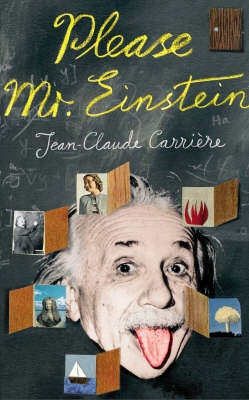
A young woman enters a building in a nameless comtemporary European city. She walks into a waiting room where a dozen people, with briefcases or sheaves of documents, are gathered. She is ushered into a large office where she meets Albert Einstein who is engaged in trying to figure out the equation that explains the universe. He is charmed by her, and agrees to answer her questions. He seems very used to receiving visitors. Among them, Isaac Newton is certainly the most regular and the most argumentative, desperately trying to prove Einstein wrong. Einstein and the student start discussing the concepts of time and space. He explains his theories about relativity and his responsibility in the creation of nuclear weapons. Einstein also talks about the difficulty of being famous, about his relationship with other scientists and how his dreams of worldwide peace were shattered. He appears bright, witty, hugely sympathetic but also tormented and dreamy. This is a remarkable book that makes complex concepts of physics and philosophy accessible to the non-scientific reader in a captivating and utterly charming manner
I feel like I hit the book lottery. I hate hyperbole, and perhaps after the book hangover has faded I'll find myself backtracking or offering qualifications, but as of right now, this last minute impulse buy, at a used book sale for $1, might be the best book I've ever read.
Ever.
I didn't think so when I started it, because the back-cover had me expecting an historical fiction; a what-if look back. I was not pleased to start that first chapter and find myself confronted with a speculative fantasy told in first person omnipresent POV. I found the narrative voice a bit condescending and supercilious and I didn't see how this was possibly going to be anything other than a pretentious attempt at literary fiction.
Thankfully that only lasted for 4 pages or so, before it became obvious what the author was setting up, and I suddenly found myself totally hooked.
Imagine the chance to step outside of time and place to have to opportunity to speak with one person in history; not only about themselves and their work, but about their entire field as it spans time and events; to be able to learn and explore ideas with a hero of the discipline, someone who changed the world.
This is the setup for the book. A nameless young woman 'finds' Einstein in a place that transcends time and she is gained admittance to his study for an 'interview'. What follows is a conversation to which we are invisible observers. This conversation spans all of Einstein's theories, what his work started; its repercussions; the emotional fall-out and the consequences of his overnight celebrity and the cost of his Jewish background.
What can I say? It's beautiful, this odd what-if of a book. The science isn't for those disinterested in physics but it isn't incomprehensible either. The personal element is ... the author made you feel like you were there and made you feel Einstein's wonder, amazement, melancholy, regret, betrayal and pensiveness; the 'doors' were an incredibly vivid way to bring the times and events to life, and a drop-in visit by Newton was both funny and heart-wrenching.
I loved this book, I loved it so much. It's so good I'm overlooking the times the author tried to argue against concepts by using the very same assumptions that he claims makes those concepts false. Everything else was so overwhelmingly good that the fallacy isn't worth a 1/2 star demerit. I closed the book wanting to hug it.
It's obviously a work of fiction but only in its construct; 85% of this book is factual representation of Einstein's and his contemporaries' theories, so if you're partial to science, philosophy, and think Einstein is a legend, definitely check this book out. I honestly just wanted to stay in that room with him forever.
(This is a English translation of the book Einstein, s'il vous plait.)
Reading updates
-
Started reading
-
24 July, 2017:
Finished reading
-
24 July, 2017:
Reviewed
